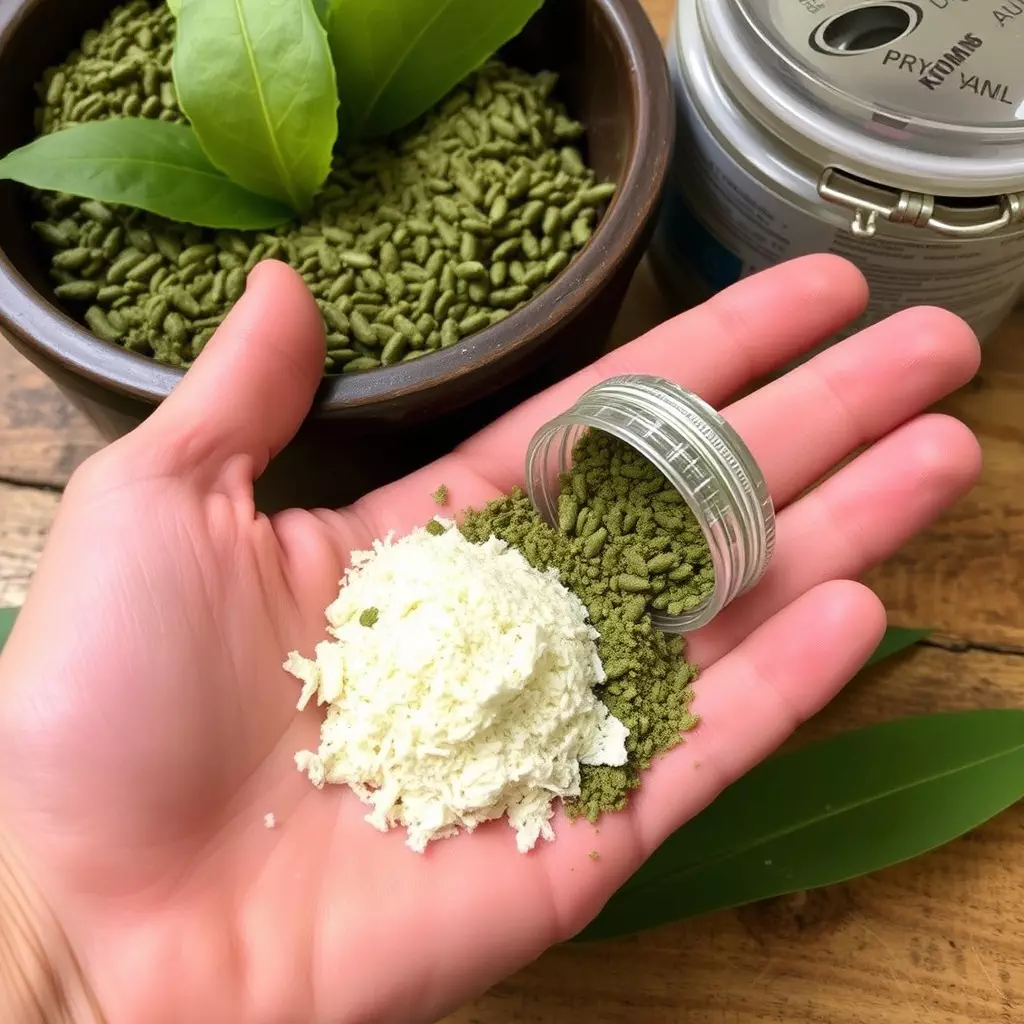Organic Kanna (derived from Stevia rebaudiana and Anacardium westindicum) is a natural remedy for opioid withdrawal, potentially interacting with opioid receptors to alleviate symptoms. Historically used by indigenous communities, modern research highlights its effectiveness in aiding prescription opioid users during detoxification. However, due to varying dosage requirements and side effects, it should be introduced cautiously under healthcare guidance and integrated into comprehensive addiction treatment programs for optimal results and risk minimization.
“Struggling with opioid withdrawal? Discover how natural remedies like organic kanna could offer a new path to healing. This comprehensive guide delves into the world of kratom as a potential tool for managing withdrawal symptoms. From understanding the challenges of opioid cessation to exploring the benefits and safe practices of using organic kanna, this article provides insights for those seeking alternative support. Learn about effective dosage, common side effects, and how this ancient herb might facilitate your journey towards recovery.”
- Understanding Opioid Withdrawal and its Challenges
- Organic Kanna: A Natural Approach to Alleviate Symptoms
- Safe Use, Dosage, and Potential Side Effects of Kratom for Withdrawal Support
Understanding Opioid Withdrawal and its Challenges
Opioid withdrawal is a complex process that occurs when an individual discontinues or reduces their intake of opioids after prolonged use. This can lead to a range of physical and emotional symptoms, including severe pain, anxiety, depression, insomnia, nausea, vomiting, and intense cravings. These challenges are often why many people struggling with opioid addiction find it difficult to quit. Opioids, such as prescription painkillers or illicit drugs like heroin, have a powerful effect on the brain’s reward system, creating a dependency that can be extremely hard to break.
The process of withdrawal can be particularly daunting due to the intensity and duration of symptoms. Many individuals seek alternative solutions to manage these symptoms effectively. Organic Kanna, derived from the Stevia rebaudiana plant, has gained attention as a potential natural remedy. Some studies suggest it may help alleviate withdrawal symptoms by interacting with opioid receptors in the body, potentially providing some relief during the challenging detoxification process.
Organic Kanna: A Natural Approach to Alleviate Symptoms
Organic Kanna, derived from the South American plant Anacardium westindicum, offers a natural and promising approach to managing opioid withdrawal symptoms. It has gained attention as an alternative treatment for those seeking relief from the intense physical and emotional discomfort associated with detoxification. The primary active compound in organic kanna, known as 4′-O-methylprenilin (4′-OMP), is believed to interact with the body’s opioid receptors, providing a soothing effect similar to endorphins. This interaction can help alleviate withdrawal pains, reduce cravings, and improve overall well-being during the challenging process of breaking free from opioid dependence.
This natural substance has been used for centuries by indigenous communities for its medicinal properties, including pain relief and mood enhancement. Modern research suggests that organic kanna’s effects may be particularly beneficial for individuals looking to end their reliance on prescription opioids or other addictive substances. By offering a gentle yet effective method of symptom management, it can make the withdrawal process more bearable, potentially increasing the chances of successful recovery and long-term abstinence from opioids.
Safe Use, Dosage, and Potential Side Effects of Kratom for Withdrawal Support
When considering kratom for opioid withdrawal symptoms, it’s crucial to approach its use with care and education. Organic kanna, or kratom, has gained attention as a potential natural remedy for managing withdrawal, but safe and responsible usage is paramount. Start by consulting healthcare professionals who can provide guidance tailored to individual needs. Dosage varies greatly depending on the specific strain and tolerance level; beginners should start low, around 1-3 grams of dried leaf powder, taken in divided doses throughout the day.
While generally considered safe, kratom can cause side effects, especially with prolonged or high-dose use. These may include digestive issues, insomnia, anxiety, or, in rare cases, severe allergic reactions. Dependence and tolerance can also develop, leading to withdrawal symptoms if use is abruptly stopped. Therefore, it’s essential to use kratom as a short-term supplement alongside comprehensive addiction treatment programs for the best outcomes and minimal risks.
Kratom, particularly its organic form known as Kanna, offers a natural and potentially effective solution for managing opioid withdrawal symptoms. By providing relief from cravings and anxiety, kratom can aid in navigating this challenging process. However, it’s crucial to approach its use responsibly, adhering to safe dosage guidelines, and monitoring potential side effects. Further research highlights the importance of organic sources to ensure purity and effectiveness. Kanna may prove to be a valuable tool in supporting those seeking to overcome opioid addiction, but always under professional guidance.





